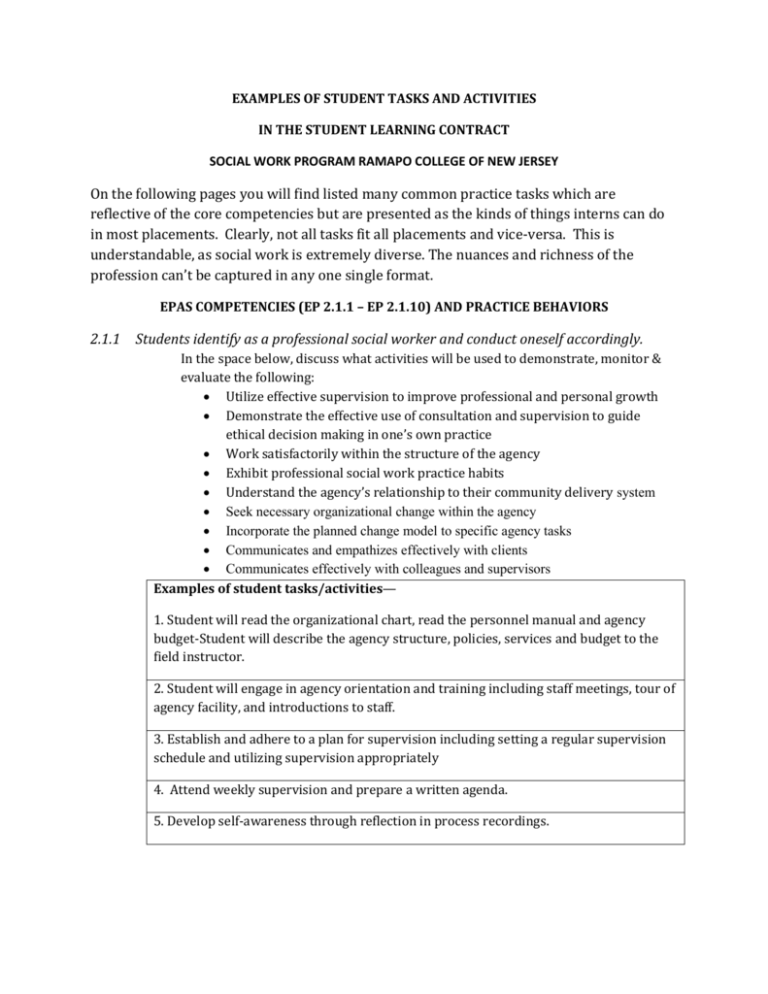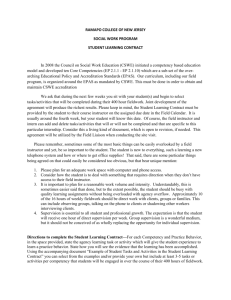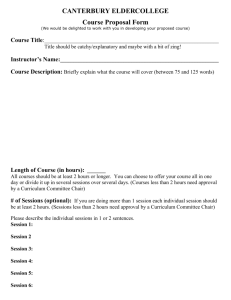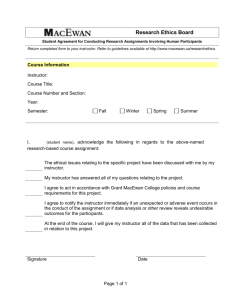EXAMPLES OF STUDENT TASKS AND ACTIVITIES IN THE
advertisement

EXAMPLES OF STUDENT TASKS AND ACTIVITIES IN THE STUDENT LEARNING CONTRACT SOCIAL WORK PROGRAM RAMAPO COLLEGE OF NEW JERSEY On the following pages you will find listed many common practice tasks which are reflective of the core competencies but are presented as the kinds of things interns can do in most placements. Clearly, not all tasks fit all placements and vice-versa. This is understandable, as social work is extremely diverse. The nuances and richness of the profession can’t be captured in any one single format. EPAS COMPETENCIES (EP 2.1.1 – EP 2.1.10) AND PRACTICE BEHAVIORS 2.1.1 Students identify as a professional social worker and conduct oneself accordingly. In the space below, discuss what activities will be used to demonstrate, monitor & evaluate the following: Utilize effective supervision to improve professional and personal growth Demonstrate the effective use of consultation and supervision to guide ethical decision making in one’s own practice Work satisfactorily within the structure of the agency Exhibit professional social work practice habits Understand the agency’s relationship to their community delivery system Seek necessary organizational change within the agency Incorporate the planned change model to specific agency tasks Communicates and empathizes effectively with clients Communicates effectively with colleagues and supervisors Examples of student tasks/activities— 1. Student will read the organizational chart, read the personnel manual and agency budget-Student will describe the agency structure, policies, services and budget to the field instructor. 2. Student will engage in agency orientation and training including staff meetings, tour of agency facility, and introductions to staff. 3. Establish and adhere to a plan for supervision including setting a regular supervision schedule and utilizing supervision appropriately 4. Attend weekly supervision and prepare a written agenda. 5. Develop self-awareness through reflection in process recordings. 2.1.2 Students apply social work ethical principles to guide professional practice. In the space below, discuss what activities will be used to demonstrate, monitor & evaluate the following: Shows knowledge of social work principles, values, and ethics to guide behavior Demonstrates the effective use and integration of social work values and ethics to guide behavior Understands how personal principles, values, and ethics influence policy Analyze one’s own practice in relation to social work standards Examples of student tasks/activities— 1. Read and review agency Code of Ethics and compare with NASW Code of Ethics. Discuss this in supervision. 2. Read agency Policy and Procedure Manual and discuss it with field instructor. 3. Student will work with three individuals having difficulty adjusting to admission to the facility. In a process recording student is expected to document personal values that are identified – Compare process recordings over the course of the semester. 4. Through supervision, identify and manage personal values and distinguish them from professional values that guide practice. 5. Student will research HIPPA laws and other laws that apply to their agency and be able to explain these laws to the field instructor. 2.1.3 Students apply critical thinking to inform and communicate professional judgments. In the space below, discuss what activities will be used to demonstrate, monitor & evaluate the following: Demonstrate an understanding of planned change process Apply critical thinking skills within the context of practice Apply planned change process skills within the context of practice Capable of developing strategies for assessing personal and professional growth Develop goals and objectives for assessing personal and professional growth Evaluate the process and effectiveness of one’s own practice Examples of student tasks/activities— 1. Complete all required professional writing accurately and present agency documentation in a timely manner and discuss with field instructor. 2. Student will interview clients, write process recordings, and practice conversation skills with all clients. 3. Field instructors will observe student while interviewing clients or co-facilitating groups. 4. Develop varied communication skills by presenting at least one oral case presentation, complete at least one written assessment. 5. Through observation of staff workers and field instructor, student will learn about planned change process and be able to understand the definition and discuss how it is implemented in helping clients achieve their goals. 2.1.4 Students engage diversity and difference in practice. In the space below, discuss what activities will be used to demonstrate, monitor & evaluate the following: Demonstrate knowledge and respect of differences in relation to age, class, color, disability, ethnicity, family structure, gender, marital status, national origin, race, religion, sex, and sexual orientation in social work generalist practice Accept human difference in social work generalist practice Practice without discrimination in relation to diversity in social work generalist practice Develop a positive worker/client relationship with diverse populations Examples of student tasks/activities— 1. Keep a reflective journal to record observations, reactions, cultural practices, that arise from working across diversity and difference in practice and discuss in supervision. 2. Research and read relevant articles pertaining to diverse populations and to enhance cultural sensitivity and discuss with field instructor. 3. Look for systems of oppression and disparities related to diversity that affects clients at the agency. 4. Student will engage with clients that differ in age, class, gender, etc. and research pertinent information. With the use of process recordings and supervision, field instructor will discuss student’s knowledge and sensitivity around recognizing differing cultural issues. 5. Student will attend diversity awareness workshops offered by the agency. 2.1.5 Students advance human rights and social and economic justice. In the space below, discuss what activities will be used to demonstrate, monitor & evaluate the following: Demonstrate understanding of significant social issues Understand the structural factors that create adversity for specific groups in society Advocate for the needs concerns of diverse populations Advocate on behalf of clients who have been oppressed and discriminated against Show an understanding of the consequences of oppression and discrimination on attainment of social justice Examples of student tasks/activities— 1. Articulate to field instructor the ways in which your agency and practice advocate for human rights and social and economic justice. 2. During supervision, examine the impact of oppression and discrimination on the delivery of services within the agency. 3. Discuss issues of oppression and discrimination with at least one client system from a vulnerable population. 4. Be aware of cultural needs when providing referrals (being aware of where clients are coming from and matching their needs to what is available), attend groups to glean from people’s stories how social injustice operates in their lives. 5. Attend relevant trainings, community outreach events, and public policy meetings. 6. Familiarize self with current political events and their effects on clients and discuss with Field Instructor. 2.1.6 Students engage in research-informed practice and practice- informed research. In the space below, discuss what activities will be used to demonstrate, monitor & evaluate the following: Develop research for evaluating social work generalist practice Critically analyze empirically based research findings and apply them to generalist social work practice Utilize program evaluation techniques to assess program effectiveness Examples of student tasks/activities— 1. Read, analyze and discuss during supervision policies and practices that impact service delivery. 2. Read relevant literature and allow it to inform practice and decision making. 3. Apply research findings to work with clients. 4. Contact experts in populations or issues and discuss best practices. 5. Interview agency staff who are conducting research about their work and findings and report this to field instructor. 6. Identify research activities utilized by the agency including data collection/statistics, current research projects and program evaluation. 2.1.7 Students apply knowledge of human behavior and the social environment. In the space below, discuss what activities will be used to demonstrate, monitor & evaluate the following: Understand social work theories and their application to professional social work practice (Bio-Psycho-Social, Cultural and Spiritual development) Critique and apply social work theory to guide the process of assessment, intervention, and evaluation Examples of student tasks/activities— 1. Use various theories to inform client behaviors and interactions and discuss with field instructor. 2. Utilize an ecomap and/or genogram in assessing level and quality of social systems in a client context. Share this with field instructor and if appropriate with client. 3. Observe and participate in client intakes and assessments, treatment plans, case reviews and consultation. Discuss with field instructor. 4. Identify conceptual frameworks that explain development and impact on a client system. 5. Provide an assessment of a client system in the context of person in environment. 6. Discuss the integration of theory and practice with field instructor. 2.1.8 Students engage in policy practice to advance social and economic well-being and to deliver effective social work services. In the space below, discuss what activities will be used to demonstrate, monitor & evaluate the following: Recognize the impact of social policy on agencies, workers and populations at risk Understand the ways policy impacts social work generalist practice Develop and implement effective advocacy strategies and tactics in social work generalist practice Examples of student tasks/activities— 1. Discuss with field instructor the implications of current public policy and relevant legislation issues on service provision to agency clients. 2. Attend staff and board meetings and/or relevant community meetings where policies are being discussed. 3. Formulate ideas towards advocacy in the interests of improving policies specific to your practice context or agency. 4. Know history and current structure of agency social policies and services. Discuss with field instructor. 5. Meet and discuss policy development and formulation with legislators. 6. Meet with clients and community members to discuss the effectiveness of policies. 2.1.9 Students respond to contexts that shape practice. In the space below, discuss what activities will be used to demonstrate, monitor & evaluate the following: Demonstrate understanding of how context (environmental, political, technological, etc.) continuously evolves and influences practice. Understand how practice can change based on societal trends to provide relevant & quality services Examples of student tasks/activities— 1. Review, evaluate, and appraise current agency services, as well as needs and trends in the communities in which services are being provided. 2. Compile data around demographics regarding who is seeking services at agency. Explore ways to provide outreach to other populations. 3. Offer suggestions as to how agency could better reach populations or develop more sustainable services. 4. Research and discuss the agency responsiveness, capacity, relevancy, and resources available for change. 5. Consider the implication of technology in developing programs and services. 6. Discuss with field instructor how client interventions can change as clients’ situations shift. 2.1.10 Students engage, assess, intervene, and evaluate with individuals, families, groups, organizations, and communities In the space below, discuss what activities will be used to demonstrate, monitor & evaluate the following: Show foundation knowledge of social work practice with individuals Exhibit practice skills enabling student to enhance her/his well-being from a strengths based perspective Apply entry level social work practice with an ecological systems perspective Understand the socialization process as it is reflected in the dynamics of individual and group behavior Demonstrate knowledge of group processes, structure, dynamics in generalist group practice Demonstrate the ability to effectively facilitate groups Understand the stages of group development as they apply to group process Apply the generalist practice model to culture and behavior of organizations Demonstrate the understanding of client advocacy knowledge and skills at the macro level Identify the dynamics of change within organizational structures and communities Examples of student tasks/activities— 1. Shadow and observe effective colleagues and other interns during assessments, interventions, and evaluations. Debrief sessions with staff and field instructor. 2. Assist, conduct and debrief client interviews using agency formats; compare to classroom tools. 3. Plan interventions with field instructor, discuss goals. Solicit feedback on outcomes and analyze data. 4. Use technology, journals and process recordings with field instructor to enhance skill growth and development. 5. Demonstrate effective us of empathy and interviewing skills. 6. Identify and discuss with clients mutually agreed upon long and short term goals. 7. Select and utilize appropriate intervention strategies. Discuss with field instructor. 8. Co facilitate group meetings. Write process recordings up and review with field instructor. 9. Participate in role play to enhance skill building. 10. Develop evaluations and intervention questions to further assessments and service needs. Discuss in supervision. 11. Attend to professional boundaries and ethical behavior in terminating services with clients. Use process recordings and journals to reflect on transition and termination issues.







